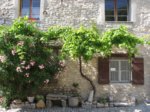Buying property in France : key players and intermediaries
The Euro Mortgageshop, Sunday, 13 August 2017

Buying property in France involves a number of protagonists at both a commercial and a legal level. Some of them play a central role in the buying process while others only put in a very minor appearance. The following guide will give you a clearer idea…
The notary
The notaire is a public official, a legal professional who enjoys a certain prestige in France. No property transaction can be completed without him. He is responsible for certifying the legal status of the sale of a house, flat or piece of land. His role is strictly neutral and his fees are fixed by government decree.
NB: a notaire may also play a more commercial role and act as an intermediary between the vendor and the buyer.
The estate agent
Not just anyone can set up shop as an estate agent in France! The profession is regulated by the so-called “Hoguet law” of 1970 that requires estate agents to be in possession of a professional card attributed by the administrative authorities (prefecture de police) of the department in which the agent does business. Acting as an intermediary between buyers and sellers, the estate agent offers properties for which he holds a mandate, organises visits for prospective customers and contributes to the negotiations between two parties. He may be responsible for drawing up the preliminary sales agreement.
NB: Estate agents‟ fees are not regulated but, the rate of commission must be displayed. The commission charged is generally between 5 and 8% of the selling price and is only paid when the sale is concluded, under no circumstances before.
It is the buyer who pays this commission, although normally included in the sale price it is wise to check.
Vendor and buyer
Vendors and buyers are frequently private individuals (a single person, a couple whether married or not, etc.). Either (or both) of these parties may also be a legal entity: a company, a non-trading real estate investment company(known as an SCI in France).
The property developer
The property developer builds houses and apartment buildings for sale ... and usually sells them even before construction work has begun. The property is then said to be “purchased from plan”, a transaction known as a Vente en l‟état future achèvement (VEFA) in French. Buying from plan is a highly regulated process in France, providing purchasers with a wide range of guarantees.
The architect
Members of a professional order supervised by the French Ministry of Culture, architects offer their services for the construction or restoration of public and private buildings. They fulfil the legal conditions required to exercise their profession as far as qualifications, code ofdeontology, professional insurance, etc. are concerned. You may decide to seek their advice if you have doubts about the quality of the construction or the need to have improvements made to the property: the condition of the roof, estimates for renovation work, etc.
The joint owners
Owners subject to the rules of the condominium.
When you buy a flat in France, you purchase one or several “units of property” (lots): i.e. the Flat itself along, perhaps, with a cellar, a maid‟s room under the roof, etc. Apart from these Private areas – of which you are the exclusive owner – the building also includes “common areas" used by yourself and the fellow owners‟ of your building.
How is a condominium, or joint owners association, organised?
The règlement de copropriété (declaration of codes, covenants and restrictions) specifies the rights and obligations of all members of the condominium as far as the private and common parts of the building are concerned. For example, it may stipulate that a given joint owner enjoys exclusive access to a terrace roof.
The charges de copropriété (maintenance and services charges) are calculated on the basis of each joint owner‟s respective share of the condominium as a whole.
The conseil syndical (joint owners‟ committee) is comprised of joints owners elected by their fellows. The role of this committee is to help, and to supervise, the property agent chosen and mandated by the joint owners‟ association.
The syndic d‟immeuble (property agent) whose appointment is compulsory for all condominiums in France, is responsible for ensuring compliance with the règlement de copropriété, for the day-to-day running of the building, and for carrying out the decisions taken during the annual general meeting of the joint owners‟ association.
Prospective buyers may contact the syndic for information about the building, and details about past or future work decided by the condominium.
The annual general meeting of the joint owners‟ association is convened at least once a year to vote on the various items on the meeting‟s agenda: approval of the accounts, renovation of the façade, installation of a lift, miscellaneous problem, etc. A summary account of the discussion is included in the minutes of the general meeting, a document that prospective buyers are strongly advised to consult before committing themselves.

Buying property in France involves a number of protagonists at both a commercial and a legal level. Some of them play a central role in the buying process while others only put in a very minor appearance. The following guide will give you a clearer idea…
The notary
The notaire is a public official, a legal professional who enjoys a certain prestige in France. No property transaction can be completed without him. He is responsible for certifying the legal status of the sale of a house, flat or piece of land. His role is strictly neutral and his fees are fixed by government decree.
NB: a notaire may also play a more commercial role and act as an intermediary between the vendor and the buyer.
The estate agent
Not just anyone can set up shop as an estate agent in France! The profession is regulated by the so-called “Hoguet law” of 1970 that requires estate agents to be in possession of a professional card attributed by the administrative authorities (prefecture de police) of the department in which the agent does business. Acting as an intermediary between buyers and sellers, the estate agent offers properties for which he holds a mandate, organises visits for prospective customers and contributes to the negotiations between two parties. He may be responsible for drawing up the preliminary sales agreement.
NB: Estate agents‟ fees are not regulated but, the rate of commission must be displayed. The commission charged is generally between 5 and 8% of the selling price and is only paid when the sale is concluded, under no circumstances before.
It is the buyer who pays this commission, although normally included in the sale price it is wise to check.
Vendor and buyer
Vendors and buyers are frequently private individuals (a single person, a couple whether married or not, etc.). Either (or both) of these parties may also be a legal entity: a company, a non-trading real estate investment company(known as an SCI in France).
The property developer
The property developer builds houses and apartment buildings for sale ... and usually sells them even before construction work has begun. The property is then said to be “purchased from plan”, a transaction known as a Vente en l‟état future achèvement (VEFA) in French. Buying from plan is a highly regulated process in France, providing purchasers with a wide range of guarantees.
The architect
Members of a professional order supervised by the French Ministry of Culture, architects offer their services for the construction or restoration of public and private buildings. They fulfil the legal conditions required to exercise their profession as far as qualifications, code ofdeontology, professional insurance, etc. are concerned. You may decide to seek their advice if you have doubts about the quality of the construction or the need to have improvements made to the property: the condition of the roof, estimates for renovation work, etc.
The joint owners
Owners subject to the rules of the condominium.
When you buy a flat in France, you purchase one or several “units of property” (lots): i.e. the Flat itself along, perhaps, with a cellar, a maid‟s room under the roof, etc. Apart from these Private areas – of which you are the exclusive owner – the building also includes “common areas" used by yourself and the fellow owners‟ of your building.
How is a condominium, or joint owners association, organised?
The règlement de copropriété (declaration of codes, covenants and restrictions) specifies the rights and obligations of all members of the condominium as far as the private and common parts of the building are concerned. For example, it may stipulate that a given joint owner enjoys exclusive access to a terrace roof.
The charges de copropriété (maintenance and services charges) are calculated on the basis of each joint owner‟s respective share of the condominium as a whole.
The conseil syndical (joint owners‟ committee) is comprised of joints owners elected by their fellows. The role of this committee is to help, and to supervise, the property agent chosen and mandated by the joint owners‟ association.
The syndic d‟immeuble (property agent) whose appointment is compulsory for all condominiums in France, is responsible for ensuring compliance with the règlement de copropriété, for the day-to-day running of the building, and for carrying out the decisions taken during the annual general meeting of the joint owners‟ association.
Prospective buyers may contact the syndic for information about the building, and details about past or future work decided by the condominium.
The annual general meeting of the joint owners‟ association is convened at least once a year to vote on the various items on the meeting‟s agenda: approval of the accounts, renovation of the façade, installation of a lift, miscellaneous problem, etc. A summary account of the discussion is included in the minutes of the general meeting, a document that prospective buyers are strongly advised to consult before committing themselves.

Search for French property and real estate for sale in all regions of France. Fermettes, gites, houses, B&B’s for sale by owner. Houses for sale in Gironde, Dordogne, Landes, Calvados, Manche and Orne
 When buying a house in France, compare market prices and use historical data. Hire a certified appraiser for an objective valuation. Consider
renovation costs and seasonal fluctuations. Special features can increase value. Set a competitive price, factor in local taxes, and be prepared for
negotiations. Emotional value doesn’t affect market value. Seek advice from a local real estate agent. These tips will help you determine a realistic
and competitive price for a successful purchase or s
When buying a house in France, compare market prices and use historical data. Hire a certified appraiser for an objective valuation. Consider
renovation costs and seasonal fluctuations. Special features can increase value. Set a competitive price, factor in local taxes, and be prepared for
negotiations. Emotional value doesn’t affect market value. Seek advice from a local real estate agent. These tips will help you determine a realistic
and competitive price for a successful purchase or s